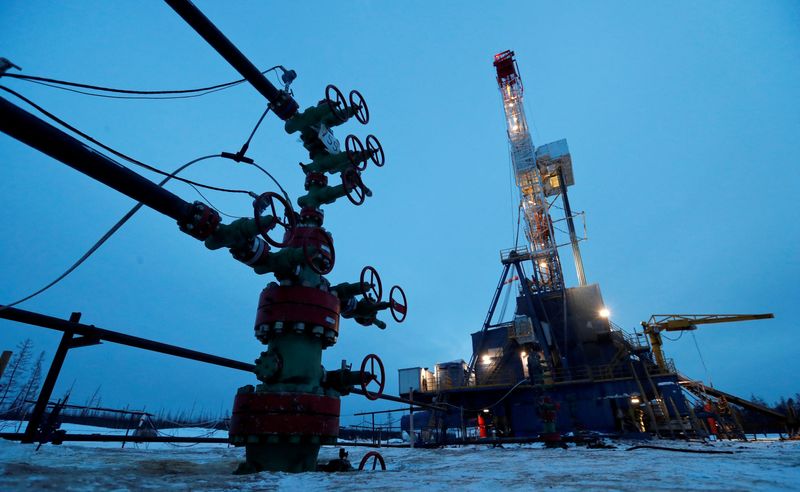By Timothy Gardner
WASHINGTON (Reuters) - As the Biden administration contemplates expanding punitive measures on Russia for its invasion of Ukraine, a big hurdle lies closer to home: the American consumer.
U.S. drivers are embarking on summer vacations with gasoline prices averaging more than $5 a gallon for the first time ever. And rising oil and natural gas prices are helping to boost inflation to the highest level in four decades, driving up prices for food, electricity and housing.
Tougher sanctions on Russia, among the world's biggest oil and gas suppliers, would likely only make that worse.
"It's like kicking them while they're down," said Ellen Wald, an energy historian and a senior fellow at the Atlantic Council think tank, said about the prospect of actions that could make prices higher for U.S. fuel consumers.
The United States and Europe have already imposed a raft of measures targeting Russia's oil exports, the lifeblood of its economy and its war machine, including export controls, a U.S. ban on Russian energy imports, a partial EU ban on energy imports.
But the Biden administration is also mulling so-called secondary sanction to ramp up the pressure. U.S. officials, for example, are in talks with European and Asian allies about imposing potential price caps on purchases of Russian oil, Deputy Treasury Secretary Wally Adeyemo said on Tuesday.
Some officials believe price caps are among several methods that could deepen Russia's economic pain without spiking global oil markets further because only the revenues would be cut, not volumes of oil going to market.
"What is happening is less about how much Russian oil is going off the market, and more about Russia’s declining oil profits as result of being forced to sell at steep discounts," a State Department spokesperson told Reuters.
But stepping up economic warfare actions on Russia without boosting prices will not be easy.
Russia, for example, could retaliate by holding oil from the market. That could immediately drive prices higher as the world's oil producers have very little spare capacity after years of under-investment in oilfields and refineries.
"Every time there is talk about sanctions, the price goes up," said Wald.
In late May, for example, global benchmark Brent crude rose to two-month highs of nearly $124 a barrel after the European Union backed a watered-down embargo on Russia's oil shipments.
Officials at the Treasury Department, which administers sanctions, and the White House National Security Council did not immediately respond to a request for comment.
When asked when secondary sanctions could be placed on Russian oil purchases and under what circumstances, a U.S. official said nothing had been decided.
Western sanctions are expected to steadily cut into Russia's crude exports next year, according to the International Energy Agency (IEA).
But so far Russia has been able to find new buyers by discounting its prices. India, for example, last month nearly tripled its Russian crude purchases, while China has also picked up more Russian barrels.
And in May, Russia's oil revenues rose as higher global prices and steady crude exports outweighed those discounts, the IEA said.
India's purchases have been on Washington's radar for months, with a U.S. official warning in March it could be exposed to "great risk" of stepped up sanctions if it purchases oil significantly beyond levels of previous years.
PRICE CAP MANIPULATION RISK
Besides price caps, the United States may also consider sanctions on entities that provide insurance or services to Russian cargoes, where transactions exceed a set price per barrel.
But enforcement of such measures would take time and resources.
"I don't think that's realistic," said Pavel Molchanov, a managing director at Raymond James investment bank in Houston. "Oil is an extremely liquid and competitive market and there is no practical way of enforcing any type of price limit up, or down."
Richard Nephew, a former sanctions official at the U.S. State Department under President Joe Biden and former President Barack Obama, was dubious about both methods, particularly about price caps, which have never been tried before on a producer of Russia's size.
"The price cap is so at risk of being manipulated, and how do you verify that system?" Nephew said.
Instead, he believes Washington could work with banks in other consuming countries to put Russia's revenue from oil sales into escrow accounts, money that Russia could only tap for approved goods and services.
But high fuel prices and the inflation it helps drive are a vulnerability for Biden and his fellow Democrats as the Nov. 8 elections approach.
A Rasmussen poll last month found that 83% of likely U.S. voters believe inflation will be an important issue in the elections in which Republicans hope to gain majorities in one or both chambers of Congress.
High fuel prices could cut appetite for aggressive action in Europe as well.

In light of soaring fuel costs, ClearView Energy Partners, a nonpartisan research group, said in a note to clients it is "skeptical that trans-Atlantic allies have sufficient political will to imminently cohere around 'secondary' sanctions on Russian petroleum exports."
(The story corrects analyst's last name in paragraph 22 to Molchanov.)